Sales are declining again, after having risen for years. Wholesale prices slip year-over-year for first time in 33 months. But “cars” still dominate “trucks.”
Used-vehicle prices in October at wholesale auctions around the US experienced the first year-over-year decline after 32 months in a row of gains, inching down 0.4% from October 2018, according to the Used Vehicle Value Index by Manheim, the largest auto-auction house in the US, running about 8 million vehicles through its auctions a year. The index is adjusted for mix, mileage, and seasonality.
This followed two phenomenal spikes that started in the summer of 2017, interrupted by partial retracements. Year-over-year comparisons are tough because October 2018 had been the peak of the second spike after “abnormally strong consumer demand,” which encouraged dealers “to spend a record amount for used vehicle inventory,” Manheim said:
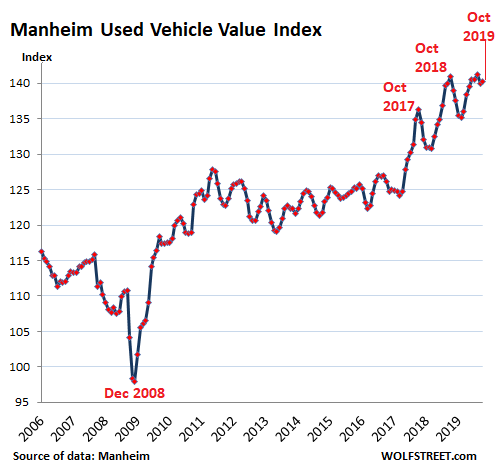
The 32 months in a row of year-over-year price gains that has now ended was the longest such period since April 2001. It exceeded the 29 months of year-over-year price gains from May 2009 through September 2011.
In those months back in 2009, which followed the collapse of the auto industry during the Financial Crisis, the price gains were initially driven by a basic bounce-back and then by the “Cash for Clunkers” program, which destroyed a generation of the most affordable cars on the road:
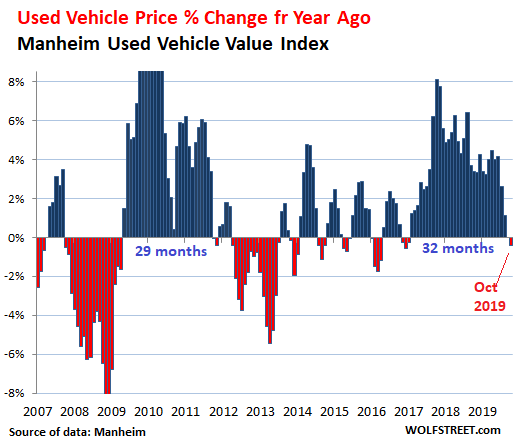
By major segment, wholesale prices declined on a year-over-year basis in all segments but luxury cars:
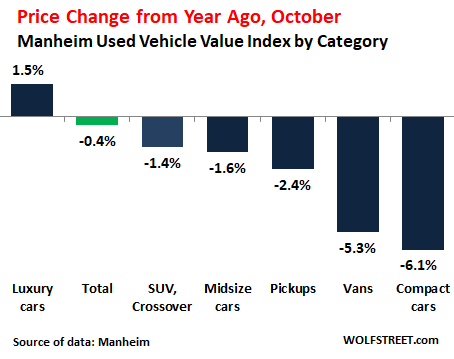
Prices of used versus new vehicle.
In terms of new vehicles, the Average Transaction Price (ATR), which is the price after incentives and discounts that the consumer pays, has surpassed $38,000 this year, according to KBB (blue line, right scale in the chart below).
The non-adjusted average used-vehicle wholesale price has hovered in the $13,600 to $14,100 range this year (red line, left scale), according to Manheim’s Wholesale Market Insights for the third quarter. Note the seasonality for used and new vehicle prices (click to enlarge):
Cars versus Trucks.
For years, I’ve been discussing what I call “Carmageddon,” the collapse of new car sales, as Americans have switched to buying new vehicles that are classified as “trucks” — SUVs of all sizes, including compact SUVs though they are based on car chassis and drivetrains; pickups; and vans. The chart below displays Carmageddon, with my estimate for 2019 based on new-vehicle sales through Q3:
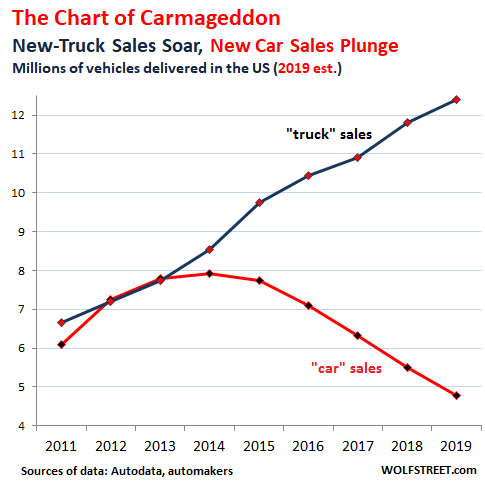
Manheim divides “truck sales” further by category to show which “truck” category of new vehicles benefited the most from the collapse in new car sales.
- The share of new cars plunged from 52% of total new vehicle sales in 2009 to about 29% in 2019.
- The share of SUVs, which include car-based compact SUVs, soared from 29% in 2009 to 49% in 2019. In other words, nearly half of new vehicles sold are SUVs and compact SUVs.
- The share of pickups inched up to 17%.
- The share of vans declined to 5% (chart via Manheim):
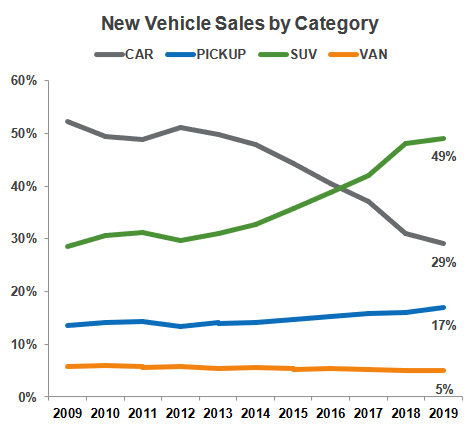
But this is not the case for used vehicles that are sold at Manheim’s auctions. The share of cars has declined since 2016 from around 53% of total wholesales, to 47% (compared to a 29% share for new vehicles). In other words, still nearly half of the vehicles going through auction are cars.
The share of used SUVs and compact SUVs has ticked up from around 30% of auction sales in 2009, to 36% (compared to a 49% share for new vehicles). The share of pickups has remained roughly stable at round 12%, and the share of vans has declined to 5% (chart via Manheim):
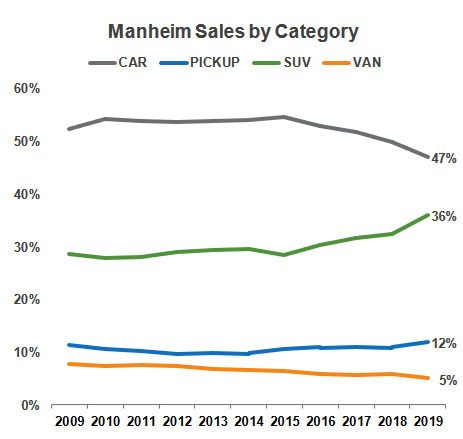
In September, according to Manheim’s Q3 report, the top-selling vehicles at the Manheim auctions were:
- 2017 Hyundai Elantra Sedan SE (compact car premium), $10,350
- 2016 Nissan Rogue AWD (SUV midsize), $13,700
- 2017 Ford Escape FWD (SUV entry), $13,150
Total used-vehicle sales peaked long ago.
Total used vehicle sales volume, which includes wholesales, rose 1.4% year-over-year in October to a seasonally adjusted annual rate of 39.6 million vehicles, according to estimates by Cox Automotive, which owns Manheim. Cox estimates that for the full year 2019, used vehicle sales will come in at 39.2 million, down from 39.4 million in 2018. The hope for used vehicle sales to once again reach 40 million units for the full year is becoming increasingly distant.
The last time the used vehicle market clocked in with 40 million or higher unit sales per year was in 2006, with peak-used-sales at 43 million units in 2005 (click to enlarge). The estimated sales of 39.4 million units in 2019 takes used vehicle sales back to where they’d been in the 1990s:
Used vehicle retail sales only (excluding wholesales) in October rose 4.0% year-over-year to a seasonally adjusted annual rate of 20.6 million vehicles, according to Cox Automotive estimates. Despite the expected decline in total used vehicles sales in 2020 to 39.0 million units, Cox expects retail used vehicles to tick up to 20.0 million vehicles, as used vehicles are an ever more essential alternative for American auto buyers who are priced out of the new-vehicle market, or for whom endlessly surging new-vehicle prices have stopped making sense.
Santander Consumer USA is on the forefront of souring subprime-auto-loan backed securities. Read… Subprime Auto Loans Blow Up, 60-Day Delinquencies Shoot Past Financial Crisis Peak
Enjoy reading WOLF STREET and want to support it? You can donate. I appreciate it immensely. Click on the mug to find out how:
![]()

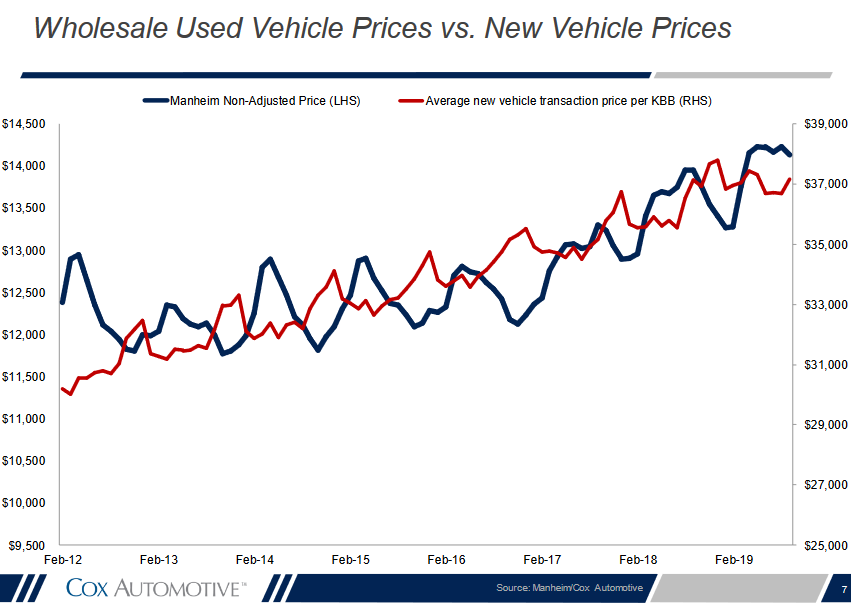
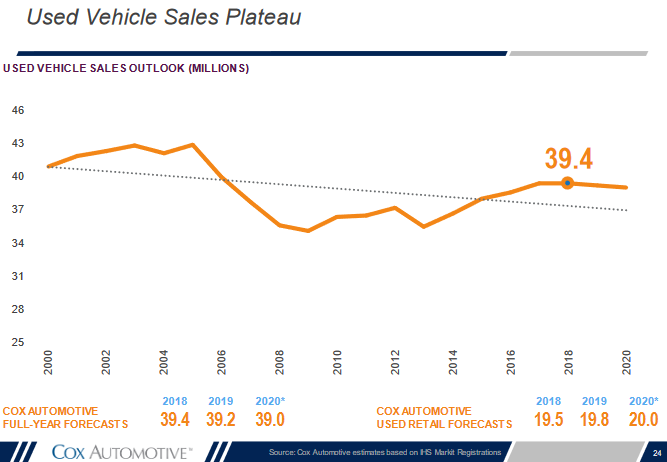

I’ll never buy another new car. My 69 Impala convt is cheap to own and maintain. $350 a year for insurance with haggerty. So much fun to drive and makes people happy everywhere I go.
Old Chevy V8s are very reliable and easy to fix. Cheap to replace. I don’t get why people buy station wagons, I mean SUVs.
I could never drive anything so slow as 69 Impala.
Seriously? You honestly cannot comprehend that other people have different priorities and preferences than you do? And you’re old enough to drive? The mind boggles …
Did you miss the part where I wrote “I couldn’t”?
Harrold, I was replying to otishrtz, not you …
I don’t know whether to say “yay” or “boo.” So many people require reliable & affordable personal transportation but have been priced out of new or lightly used cars. A worn out car can be a cash vampire for a poor single mother. Cash for clunkers was an economic disaster to many working poor by shrinking the pool of good cheap beaters. The sparse public transportation in most US communities doesn’t meet the needs for most US folk surviving in US sprawl. My coworkers think I’m a strange bird for occasionally walking a mile to the bus line then riding to work. Those days are more of a lifestyle choice than a necessity because
I have a car and free work parking. But the construction laborer might face a 2 hour hell ride with 4 transfers to get to a job site in my sprawling metropolitan home. That cheap Ford Exploder that got crushed in Cash For Clunkers could be fixed with a $75 chinesium alternator from Pep Boys.
I say yay. I hope used car prices go down. Maybe I’ll be able to pick up an old pick up to add to my stable.
Speaking of stable, I expect zero price depreciation should I ever be foolish enough to sell Beaulah.
Agreed. Millions of poor people lost access to transportation, but everyone in San Jose felt good and patted themselves on the back as they saved $4500 off a new Prius…..that they would have bought with or without Cash 4 Clunkers.
Millions? Only 690,000 cars were traded in under the CFC program.
1 car affects several people in a family. And those cars could have been bought and sold multiple times over the past 10 years.
Hence millions of people affected
The top vehicle traded in was the Ford Explorer. No way those late 90’s Explores would have lasted much past 2009 to allow “millions” of people the experience of riding in a subpar automobile.
An old friend of mine rides the bus to work, which astonished me. He just isn’t a bus kind of guy. He explained: “It takes the same hour and a half to get to work (from old downtown Santa Clara to a company in Sunnyvale north of 101) and it’s *their* gas. Plus, I get to read a book”.
Those people don’t get to pollute with old vehicles just to make you feel better.
Cash for clunkers is a decade ago. It let to more cheap beaters now.
ps. Don’t use construction workers as an example for public transport. They are rarely locals and as such have problem with public transport. In fact they probably endured a 2 hour car ride
Last new car purchased 1985 VW Cabriolet – fun, but no cargo room. I went through a “Jeep” phase (CJ-5 with snow plow,CJ-7, 3 Commandos) 25+ years ago so that’s when I really learned to wrench :)
I love used cars. You have to look carefully but they do last longer, now.
In 2017 replacing ’97 GMC PU w/237K I bought an ’07 F-150 w/ 8’bed, 89K for $9,500; in 2019 the IRS pays me .58/mi for about 5,000 work miles out of 13,000 total. I perform all maintenance and repairs. The math is easy.
I still have a paid-for convertible in the garage.
So many solid G body cars went to an early grave die to cash for car crushers.
I’m willing to wager that they age well and get more desirable over time because so many were needlessly destroyed and nothing like them has been made since. Only plastic mediamobiles shaped like a smushed loaf of bread on the road these days.
And those damn Priuses. How long is the useful life of a ten year old Prius anyway?
There was a 25 year limit on trade cars under CFC.
Recently bought 12 year old Prius for $3000.00. Had 112000 miles and now 126000. No one wants them but this “beater” has been great so far. Yes will need battery pack at some point and rebuilt installed would cost 1500.00. Even came with added plug in extra battery pack that has 20 mile range and get 99 mpg around town with it in all electric mode. Average mid 40s in regular hybrid mode. Putting much less mileage on Tahoe and Subaru. So far so good.
The obvious solution is another multi billion dollar government cash for clunkers scheme.
Because the first worked so well…
I know it is required to complain about cash for clunkers but did it not work well? Yes, a lot more cars were sold.
32 months up, 1 month down. How about we wait for a few more down months before pronouncing the auto industry dead?
Besides who buys a car anyway? Leasing is the way to go. Oh bbbut bbbut bbut everyone *KNOWS* leasing is the worst thing you can do. Maybe, if you don’t know how a lease works and/or don’t know how to negotiate one. If you do understand how leasing works, and how to negotiate leases and how to find the best deals…it’s a no brainer.
Generally speaking a good lease is 1% of MSRP ($50K MSRP, $500/mo lease for example),. Sometimes you get crazy good deals like I did and you’re well under 1%. My wife and I drive 2 cars with a combined MSRP of $110K. Combined lease, including sales tax $800 with $0 down (don’t ever put anything down on a lease, never, ever, never, ever, never).
$0 cost to maintain, as they’re both under warranty for the duration of the lease and nothing is really needed within the first 3 years either. One of the cars may need tires, but that’s about it. The OEM tires it came with, run flats only last 25-30K miles unfortunately. I had those things with a passion.
Then once the 3 years is up, return the keys and get into something new again.
Could I save a couple of bucks and drive a 10 year old car instead? I suppose. But I don’t *WANT* a 10 year old car out of warranty with 10 year old safety/tech. And would I save all that much when taking into account the maintenance needed on an old car? Add in the time spent either doing repairs yourself or taking the car to a mechanic and the savings quickly evaporate. People never factor the value of their time in these calculations. I’d rather be out enjoying life than spending a weekend day fixing my car.
YMMV of course.
Just Some Random Guy,
“How about we wait for a few more down months before pronouncing the auto industry dead?”
“Dead”???? — who the hell said anything about “dead?” Read the frigging article – you might actually learn something – and quit trolling this comment section with your BS.
“Besides who buys a car anyway? Leasing is the way to go.”
Good lordy, unit sales include leases. It’s industry standard. It’s in every single article I have published on this topic since Adam and Eve. They’re in one bucket for a simple reason: when you lease a car, there is a leasing company that BUYS the car from the dealer or manufacturer and leases it to you. So a lease always involves a sale. The leasing company (a bank, a specialized leasing company, or a captive) is on the title because it bought the car. So when you count sales, leases are included.
Before retiring I sold Buicks and GMCs. Most were leased and many to repeat lease customers. If a customer trades cars every 4.5 years on 72 month buys, they are always making a payment anyway. If you drive 15k or less and want a nice vehicle, leasing works. BTW, over half of the non-lease sales were cash sales. Our market area was upscale. I had accountants explaining to me why leasing was a great idea.
What I started out to say though, is how surprised I was to realize the number of people that did not realize a “sale” was involved in leases-and a very profitable one before full disclosure.
Of course leases are included. Leases are simple sales to the leasing company, which in turn leases the car to the consumer. Everyone knows that. What I meant was a response to the commenters moaning about cars being too expensive to buy. And what I was trying to say – granted could have been more precise – was who *BUYS* cars anymore? As in, the cost to buy is irrelevant from the consumer’s point of view.
Same with pronouncing the market dead. It’s what the commenters do best here, take one small piece of negative news and pronounce the industry/economy in shambles.
Meanwhile stocks set another record today. GM was up today, as was Toyota, as was Tesla. All this bad news in the auto industry and funny enough auto industry is up. How does that work? Could it be that maybe, just maybe, you’re over reacting to this “downturn” and it’s most likely just a blip? Just spitballing.
Lots of people buy cars, and for lots of reasons that apparently your sophomoric “nobody should value any aspect of ownership any differently than I do” mindset cannot comprehend.
Seriously, what’s with people on this discussion who are completely unable to see the world from any viewpoint other than their own narrow view? Like do you actually understand that not everyone values the same things the same way you do? How have you lived on planet Earth long enough to learn how to type and use an internet browser without figuring that out?
Just a point about the last statement, spending a weekend doing maintenance is enjoyable to some. I enjoy maintaining a vehicle, it’s something called pride. Everyone expresses it in their own way, but I don’t get a sense of pride knowing someone else owns my car.
Enjoy having a continuous payment on your fleace. I buy CPO vehicles and spend $0 and 0 hours working on them. Cut a check once every 4-7 years for $12k or so after trade in of the last one. About the only thing other than oil changes or wiper blades I spend money on is maybe a set of tires and front brakes.
Used vehicles easily last 150-200K miles with almost no maintenance. A continuous lease is far more expensive than buying a late model used car with cash and holding the car for 10-12 years until it starts to develop mechanical problems.
I’ve spent less than 1,000$ on my now 13 year old 4 runner (front wheel replaced), in addition to very inexpensive oil changes. A continuous lease of the same vehicle would have cost twice as much. It has ABS. and 4WD. There isn’t any other tech I want or need. With a little luck, it will probably deliver another 10 years of almost maintenance free use.
Leasing is about people having a preference for new vehicles. If you are someone who must have the new vehicle every 4 years, it does make sense, especially if you can claim business use. But it isn’t financially better than buying and holding.
Wolf, your competitor at ZH featured an FT article yesterday, on the weight that the auto industry has on the global economy:
https://www.zerohedge.com/economics/recession-auto-industry-tanking-global-economy
As I’ve indicated in earlier comments, autos are key drivers of the global economy, in terms of intensive resource usage (i.e. manufactured materials with glass, plastics, aluminium, rubber, microchips, oil/gasoline etc.), as well as a significant contributor of “sales revenue” towards overall GDP “growth”.
Cars, trucks included, are relatively expensive to run and maintain (many would say overpriced) and are arguably unnecessary tools.
Compared to dunking money on a house which can be owned in perpetuity and willed to your children; autos are a depreciating “asset” that eats up the very foundations of your wealth-building, especially when you are younger and/or earning just a middle-class salary.
I’d say millenials are on the right track to financial independence if global auto sales are anything to go by, at least they got this one thing right .
In other words, there’s a bit of a paradox going here:
The less autos people buy, the less “growth” in world GDP.
And whats good for the global economy is NOT good for your own wealth and vice versa.
Most of those whom I know who deferred or otherwise forgo buying autos are doing very well financially now with a good portfolio of rental properties and/or decent stock dividend incomes.
Conversely, those friends of mine who loves fast cars when they were young adults and likes to “show-off” their expensive rides, are now driving old wrecks or taking public transport to work.
I believe there was a scientific study that said something about deferred satisfaction being a good behavioral indicator of long-term planning ability, which leads to financial success in the later years of one’s life.
Banal truth that works.
And watching your kids on how they spend their pocket money can tell you a lot about their character and likely life-arc ;-)
kevin,
The auto industry isn’t big enough to “tank the global economy.” That title is effing brain-dead click bait.
And you fell for it, because you didn’t read the ZH article, and you posted it here without actually reading the article.
This is what the article actually said, citing the FT:
“This drop off in car sales could have reduced world GDP by “as much as 0.2%” according to Fitch.”
“Tank the global economy” by reducing world GDP by as much as 0.2%.….. Trim world GDP by 0.2% means it goes from 3.4% growth to 3.2% growth. And this is “tanking” the global economy? You gotta be kidding me.
This is what happens when you fall for a click-bait headline and then without reading the article post it here: I’ll shred before your eyes.
Wolf, its not that long an article, so I DID read through on it, and your competitor ZH maybe a tad alarmist, but the source article was from FT.com.
It also quoted this within the same article:
“The sector may also be responsible for up to 33% of the slowdown in global trade growth over the same period, the IMF said.”
IMF says 1/3 og global trade affected by auto sector, and yes I’m aware of the discrepancy between this and Fitch’s 0.2%.
Well, we could still argue that IMF said “may” and not a definitive “is responsible for…33% of the slowdown”
I don’t have the source data to reconcile the above, but I doubt FT is one prone to “effing brain-dead click-bait”, given that theirs is still very much a subscription-based model.
Anyway, there is little doubt that the auto industry is a driving force for consumption both in terms of material usage as well as measurable “dollar-spend”, given that the typical automobile cost can buy you the equivalent of a truckload of other stuffs.
Even without data, common experience tells us that just one vehicle purchase easily exceeds the equivalent spending and economic “churn” of :
– 500 packs of baby diapers
– 2000 Joe six-pack beers
– 12 units or more of 50-inch HDTVs, which can cover more than an entire lifetime worth of binge Netflix watching.
-etc… you-get-the-picture….
Private vehicles is very often the 2nd highest cost item (behind home purchase) almost everywhere around the world, so its no surprise that global consumption dollars will fall if the auto industry is facing falling buyer interest.
Sorry Wolf, if its your bad-hair day, but we don’t need click-bait to inform us on the common sense with the impact of the auto sector.
Used auto graph looks like new auto graph latent 4 years.
kevin,
You’re getting everything confused.
1. “Trade growth” is NOT GDP growth. A million miles from it. For the US, trade is a negative to GDP because of the huge trade deficit.
2. If global trade slows by 2% (but global trade is still up year-over-year), 33% of the 2% slow-down would be due to the car business. So the car business would be responsible for slowing trade down by 0.7%.
In the US and Europe, vehicle sales have gone essentially nowhere since 1999. There has been a plunge in the middle and a recovery afterwards, and that’s it.
The most recent peak in the US was in 2016. Unit sales have declined ever since. Economy is fine.
It’s a horribly mature business, but unless it collapses as it did during the Financial Crisis with sales down 50% over a two-year period, it’s not going to “tank” anything.
Some countries are uniquely exposed to the auto industry and auto exports, such as Germany, and it’s going to feel a little heat, but it’s not going to “tank” its economy either.
In the US, the auto slowdown has been going on since 2016, which I have written about endlessly, with layoffs and plant closures and all, and the economy is just fine.
Once you quote ZH, you’ve already lost the argument.
“Your competitor at ZH” Huh? Two very different platforms run by very different People. both are top choices for non corporate MSM propaganda. Both sites complement each other although i appreciate Wolf keeping the comment section “clean” so i don’t have to wade through lunatic rants from cave dwellers. I have learned quite a bit from commenters on this site and Mr Wolf himself of course and regard this as my top go to blog. ZH on the other hand is the Wild West where anything goes,unfiltered,uncensored and raw. there is something to be said for that approach as well,after all this is the real world,lunatics and all….
Sorry to go off topic,so 38000.00 average price for a new car just seems to mirror the crazy price inflation of RE and Stocks imo. Just leased a 2020 Kia Optima for 205.00 mo. great car btw. will dump it at the dealer in 24 mo,it’s their problem. All auto makers are preparing for much leaner times,time to get a great deal and enjoy the DRIVE!
Did you have to provide any money down at the time you took out the lease? If so, how much? Did you include that in your $205.00 per month or not?
I am banned from ZH because of my comments on the articles. I’ve found ZH to scour the internet for the most obscure sites and blogs and post it up as gospel. When I would find fault with the posts too many times, ZH did not like it.
Jesus baldski, What kind of comment gets one banned from ZH? I feel like I’m on Stormfront reading the comments of some of the reprobates there.
Well a used truck can provide income, say mow lawns, or haul garbage to the dump, just an ad in craigslist for the service and you can make +$100/day, or load/trip
What point is there owning a ‘car’, can’t sleep comfortable, a truck/van basically is a poor mans RV, I think this stuff will sky-rocket :)
Also the price of new is crazy, hell 30 years ago a new cummins turbo diesel was $15k, now they’re almost $100k, no inflation … move along
Lastly, I’m not sure if ppl think about this, but driving a truck your much less likely to get pulled over by a cop, cop’s don’t generally mess with ‘working ppl’, they’re looking to scavenge on the parasites;
Trucks are generally better built, ‘cars’ tend to fall apart, as the suspension is not designed for the pot-hole hell-ways of the USA.
Trucks have always had a better resale value, as guys who work always need a truck, but nobody ‘needs’ a Pinto or a Gremlin
I do not think trucks make ecological sense. How does one justify using a 6000 lb. vehicle to transport a 150 lb. individual?
Correction: 270 lb. individual, including the cheeseburger and fries on the driver’s lap.
Haha back when I had a Prius, I looked at the actual load carrying capacity and it’s essentially a Japanese family of 4 with their luggage, or two average Americans and their overnight bags and a couple’a Big Gulps.
I live in a rural area on a farm and we really need trucks. Also the traffic and drivers are so insane around big cities that some people get them so they are higher up and have more “road presence”.
I don’t like those selfish people who obstruct everyone else’s view so that they can have a better view themselves. Then again I drive too fast so I guess we all have our faults.
Put a hitch on your prius, and you can be my uber driver
and haul my backhoe to job sites.
I save money, you save the environment….win win.
Do you also serve “fair trade” coffee on the ride?
I actually can and have slept comfortably in my Subaru hatchback. With the right jiggering (passenger seat all the way forward), I can stretch out fully (I am 5’11”).
I don’t want to drive a truck because I don’t like trucks. But I see you are another person posting here who cannot understand why anyone would make choice other than the one you make so … whatever.
OK, why have a comment love in? I’m going to defend ‘cash for clunkers’ except for the program’s name. It should have been called ‘cash for guzzlers’
The program was basically a fuel efficiency drive, not a get rid of old cars drive. Here is one of the rules from Wiki:
The new car bought under the plan must have a suggested retail price of no more than $45,000, and for passenger automobiles, the new vehicle must have a combined fuel economy value of at least 22 mpg‑US (11 L/100 km; 26 mpg‑imp).[18]
I see the first comment is in praise of a 1969 V-8 (carbed) , and its cheapness to fix. I’m sure, but it sure as hell isn’t cheap to fuel. I’m driving Honda (300K kilos) with a 1.7 4 cylinder. I’m spending about $160 C per month on gas. There is no way I could afford an old V 8 even if I wanted one.
There has been a lot of comment on this site about the foolish decisions car buyers make. One of these is focusing on sticker instead of cost to operate, i.e., gas.
I’ve no doubt that a lot of the older guys with old V 8 s CAN afford them, but a lot of the younger working class were trapped in these guzzlers and I’m sure the program helped many out.
BTW: The price of oil is less than half its record and well below its average. If oil was to hit a hundred a barrel AGAIN it is likely GM goes bankrupt again.
Attention:
This is NOT inflation!
Nice write up of what a disaster Cash 4 Clunkers was.
https://qz.com/1042742/why-did-cash-for-clunkers-fail-a-new-paper-explains-how-obamas-stimulus-program-backfired/
“The authors estimate that households forked over an average of $7,600 less per subsidy for a new set of wheels than they would have otherwise. Add all that up, and even under conservative assumptions, argue the authors, the program cut new vehicle spending by about $2 billion (and it could be as much as $5 billion). The authors also find that the de-clunking helped cut environmental damages by $253 per vehicle. That’s surely not nothing, but it’s also not a lot of bang for fiscal buck.”
Spend $4500/car to get back $253. A program so awful, only a govt bureaucrat could love.
But wait there’s more…C4C was billed as a way to help the struggling Big 3. Once again, epic fail.
“Still, Cash for Clunkers didn’t exactly help the intended beneficiary, US automakers. The nearly 39% share of autos sold under the program was actually about six percentage-points less than their overall market share at that time.”
So to sum up, C4C spent $4500 per vehicle to get $250 worth of benefit, while giving Japanese auto makers a larger market share of the US market.
BRILLIANT!!
I love the market for used cars. Something for everyone at any price. It’s the opposite of socialized market where choices are few and quality is usually poor.
As I mentioned before, I bought a 12 year old Mercedes S430 for less than 10% of the cost of a new one. It’s probably the most value for my money that I have ever recieved other than a $30 microwave and a $60 Samsung phone.
Used? New? Whatever you want at whatever price point. The perfect free market. As one who remembers my Dad’s 1948 Studebaker as a starting point for dozens of autos in my lifetime, all have spelled FREEDOM in my mind.
To just add to many of the comments above, The Wolfstreet Report is my daily “go to” for straight, honest information. I read everything about cars, trucks, economy Wolf writes.
Wolf covers other areas as well but I skip those because they are not of my interest or are over my head.
But for straight, well-informed info, this website is my daily “go to”.
And no, I have never met him, nor filled his beer stein, nor a close relative.
To an extent, I think the car manufacturers are doing it to themselves: For the last six years, I have leased a Honda Accord LX. Cap cost on both leases was around $19,000. At the end of my most recent lease, I discovered that the model I’ve been driving has been discontinued, and the closest equivalent is $23,000 to $26,000 depending on which engine I chose. Instead of leasing again, I’m purchasing the current leased car. I expect this to take me out of the market for a new car for at least 10 years.
The other factor was that I don’t want to deal with the den of thieves known as my local Honda dealer. Honda Finance initially tried to claim that I needed to do the lease buyout through my local dealer. When I went down there, they informed me that they would be happy to process the buyout, but insisted that I had to buy their $995 “Lifetime Powertrain Warranty” as part of the transaction. This on a Honda 4-cylinder that’s still under the factory powertrain warranty. After some complaining to Honda Finance they figured out how to process the buyout without the dealer’s involvement. I will go to a great deal of effort to never deal with these dealer idiots again.
Would you have been further ahead to just buy the car in the first place? I have heard at least one financial adviser say: never lease a car.
One advantage to leasing over buying is that you purchase a lemon rather than leasing you are really in trouble. On the other hand if you are acquiring a car with new technology or with some hidden manufacturing flaw, a lease will serve you well. If the new car has oil dilution issues or plastic timing chain tensioners that the buyer was not aware of at the time of purchase, a lease would save him many thousands of dollars when the engine fails just outside of warranty coverage. Ask me how I know.
The local Honda dealer has saved me a hundred grand at least. Just trying to buy a car was so much effort I would give up everytime. It was easier to just repair the current car I had (and still have).
I would have been willing to just buy a Honda as advertised on the Corporate Honda of America website and pay full retail price. But by the time the sales person added up all the garbage I did not want and told me it was a good deal and it was the only way I could buy the car, I walked out in disgust.
Morning… The articles and mention of “Used Cars” always reminds me of Kurt Russell and the mile of cars. Remember “$50 never killed anybody”.
Great line from Kurt in that movie: “Maybe I can find some chick with half her s@@t together.”